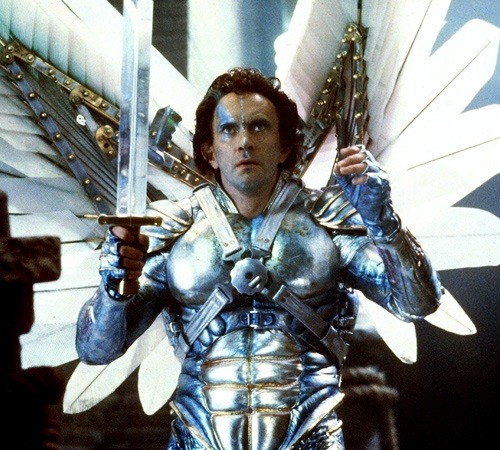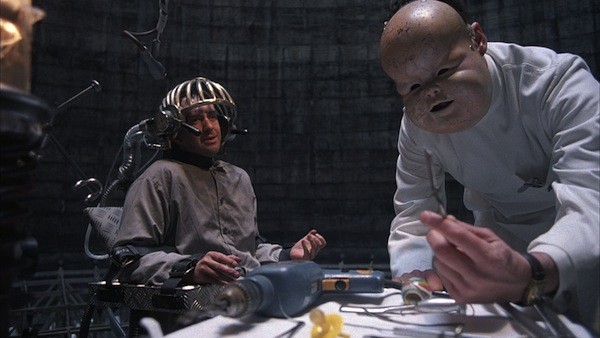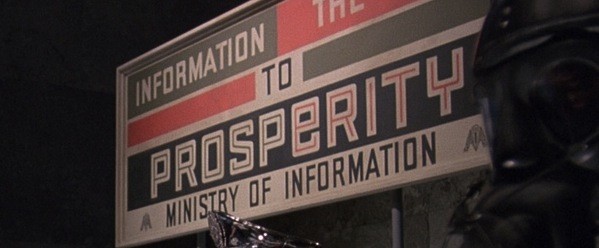This week we’re tackling films from 1985 on Throwback August, which means I get an opportunity to write about one of my favorite films of all times, Terry Gilliam’s Brazil.

The production of Brazil is one of the most infamous and convoluted stories in all of Hollywood lore. Gilliam, Monty Python’s resident animator, had embarked on a solo directing career as the legendary comedy troupe went their separate ways. With the Python cache and the 1981 sci fi/fantasy hit Time Bandits under his belt, betting on Gilliam’s fevered imagination seemed reasonable to Twentieth Century Fox. It was 1984, so naturally Orwell was in the air. What would be the most successful screen adaptation of Orwell’s dystopian classic was already in production, and Gilliam promised a modernized take on the themes of surveillance and oppression with the trademark Python satirical bent. He delivered all that and more—it’s also a Christmas movie.

Johnathon Pryce as Sam Lowery in one of Brazil’s dream sequences.
Costs ballooned during filming, as Gilliam added elaborate dream sequences and fussed over the details of the production design. The final tally was three times as much as Time Bandits, and when the producers saw Gilliam’s cut, they belatedly remembered the old Broadway saw “satire closes on Saturday night.” The epic pissing match over the the final cut and the release are detailed in the book The Battle Of Brazil, but Gilliam found himself facing every director’s worst nightmare, and not for the last time in his career.

Pryce and Michael Palin as Jack Lint in Brazil‘s climactic torture scene.
The film, hurt by the bad publicity and buried by the petulant studio, lost money on its initial release, but it quickly established a cult audience, and has had an enormous impact on filmmaking for the last 30 years. During a recent screening at the Brooks Museum, the story of daydreaming bureaucratic lackey Sam Lowery’s (Jonathan Pryce) struggle to keep his identity, do the right thing, and find the woman of his dreams still resonates in strongly in 2015. Particularly prescient are the themes of the unnamed society’s information economy as a means of both financial exploitation and social control— a banner in the Ministry Of Information offices reads “Information The Key To Prosperity”.

Gilliam used production design to convey thematic information.
Lowery and the other hero, the mysterious, rogue HVAC repairman Harry Tuttle (an unrecognizable Robert DeNiro), are both tech whizzes disdained and manipulated by the privileged ruling class. A seemingly senseless and endless War on Terror provides the low hum of paranoia that pervades the film’s action and gives gentleman torturer Jack Lint (Python Michael Palin, in his best film role) his wealth and status. Terrorist bombings are just part of the background of life in this dystopian society, like we now routinely make a public show of getting upset about the latest mass shooting but then go on about our business.

Robert DeNiro as revolutionary HVAC repairman Harry Tuttle.
The notion that the terrorist attacks might all be faked as a way to keep the ruling class in power is also present. When truck driver and Lowery’s object of affection Jill Layton (Kim Griest) asks, “How many terrorists have you actually met?”, she could be speaking to us. That, and the scene where Information Retrieval shock troops arrest Sam and Jill in mid-tryst are two of the many direct allusions to Nineteen Eighty-Four.

Kim Greist as Jill Layton
But Brazil has bigger fish to fry. In its final act, it becomes a inquiry into the nature of reality itself. Gilliam takes his endgame from the Ambrose Bierce’s 1890 short story “An Occurrence At Owl Creek Bridge”, where much of the action presented as real in the story turns out to be hallucinations of the dying protagonist. It’s one of my most hated fictional gambits, because it’s usually a cheap trick on the part of an author who has written himself into a corner. And yet, Gilliam makes it work in Brazil because it serves his bigger themes: As the elites gain increasing power to work their will on the individual, the mind is the only preserve of freedom we have left.
Throwback August: Brazil
